Uluslararası Geçmişten Günümüze Tekirdağ’da Dinî ve Kültürel Hayat Sempozyumu, 5-7 Nisan 2019, Tekirdağ, Türkiye.
International Symposium From Past to Present Religious and Cultural Life in Tekirdag, 05.04.2019, Tekirdag, Turkey.
More...We kindly inform you that, as long as the subject affiliation of our 300.000+ articles is in progress, you might get unsufficient or no results on your third level or second level search. In this case, please broaden your search criteria.
International Symposium From Past to Present Religious and Cultural Life in Tekirdag, 05.04.2019, Tekirdag, Turkey.
More...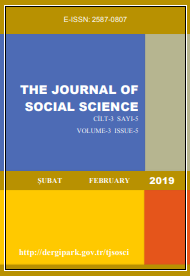
The contract for work has been implemented since the ancient history as a need for people. It was implemented for the purpose of supplying simpler goods that were not ready for purchase at the time of contract in early periods. It is emphasized that this feature does not cause harm and deception for the parties. This transaction gained its legitimacy by becoming customary law in some goods and took its place in the legal systems. It is possible to observe this situation starting from the Roman Law in line with western law and to follow it in Turkish Law. In terms of the legitimacy of this contracts in Islamic law, it is especially made emphasis to the customary law implementation especially in the Hanafis. It is accepted that there is a general acceptance due to the need and prevalence in practice. Otherwise, it will be subject to the prohibition rule on the sale of non-existing goods which is being in the classical approach. The debates in the legal nature of this contract have been significantly concluded with Mecelle in a way that responds to current needs and this is reflected in Ottoman law as well. The contract for work which has the opportunity to practice in many areas ranging from simpler topics and construction projects to the finance area, can be the subject to agreement. At this point, it is possible to talk about the aspects of Islam and Turkish Law which are more similar than the points they are separated.
More...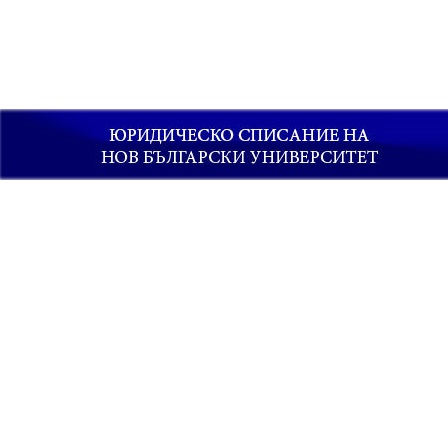
The subject of the following report is The issue of suspended sentence in Bulgaria, legal terms for the "probation period" and its importance for the criminal law. The student analyses the current legal organisation of these issues and comments on the main points of the "probation period".
More...
The following project is dedicated to the issues of suspended sentence and reprieve. A comparison is made between the current legal organisation of these two institutes of law but the emphasis is put on their differences.
More...
On the thesis “ criminal law redime of conditional condemnation on under ade person. The report focuses on the following questions: concept for ‘condemnation conditional”; Ralation order; Punish person; Specific punishment which are execute in respect of under age perpetrates offence.
More...
The probationary conviction of adults is the veritable probationary conviction. It is a general institute, which finds application with regard to all crimes and forms of criminal deeds. Its significance is expressed in the attainment of the goals of the punishment with postponement of its effective serving, but with imposition of preventive, correctional and reforming over the convicted person.
More...
The problem of suspended sentence and the juvenile criminal responsibility is discussed in the following article. Here are comment the articles of the Criminal Code and the articles of the specialized act for restriction of the juvenile criminal behavior.
More...
In Croatian criminal law the suspended sentence is one of two non – custodial measures (the second is admition) with the purpose of giving the perpetrator a reprimand wich achieves the purpose of criminal sanctions by pronouncing a sentence without executing it. This work examines from all sides the criminal law practice in Croatia referring to conditional and suspended sentence and probation.
More...
Conditional sentencing and early release are two types of release from serving a sentence. The exemption from serving a sentence allows the state to use less criminal coercion when committing a crime.
More...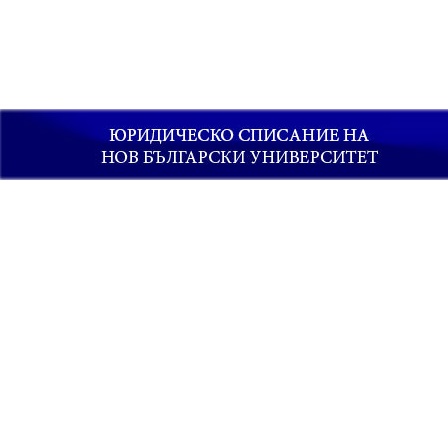
The article focuses on the amendments of the Bulgarian Constitution regarding the legal membership of Bulgaria to the European Union. The text of the new Para 3, Art. 4 which was included to the Constitution before the signing of the Accession Treaty has been analyzed. Article 4, Para 3 states: “Bulgaria contributes to the building and development of the European Union.” The personal opinion of the author is that in the future the common European values will be part of the Bulgarian legal order.
More...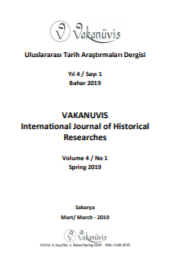
The Kadıasker Notebooks, also known as Şer`iyye records, are one of the most important sources of history research. Between 1666 and 1670, we examined the Crimean kadiasker book with the number 67 A 90 and made evaluations about the cases by examining the cases of the Jews’s routine lives in the Crimean region. These cases led us to understand and evaluate the social structure of the Jewish community living in Crimea in social, economic, administrative and legal fields. We have reviewed all kinds of details, from the names of the places where the Jews live, from the professions they work to, from their own cases to the cases of Muslims. We tried to put all aspects of the relationship of the İslamic law with the Jews.
More...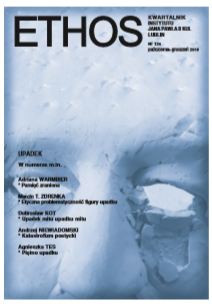
Review of: Adam Strzembosz’s Miqdzy prawem i sprawiedliwosciq. Rozmawiat Stanislaw Zakroczymski [Between the Law and Justice: An Interview by Stanislaw Zakroczymski] (Warszawa: Biblioteka “Wi^zi”, 2017; Review by: Adam F. Baran
More...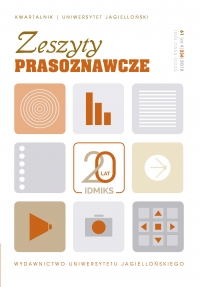
The article is devoted to the issue of evaluation of investigative journalism within the legal and social system. The paper presents the subject matter from different points of view. The evaluation of investigative journalism must be ambivalent, because this phenomenon has many negative traits, however, it must be admitted that it has positive elements too. It is a anachronistic phenomenon, because journalist realizes the function reserved for state bodies established to criminal prosecution. On the other hand it is characterized by utilitarianism, as may contribute to the detection of offence previously unknown to investigative authorities and the public disclosure of this offence. The opinion is presented that investigative journalism should concern exceptional situations. The most rigorous standpoint must be connected with illegal methods of provocation, because in such situations admissibility of their application must just related to extreme cases.
More...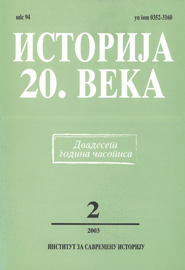
Proceedings to Rudolf Slanski, ex secretary general of Communist party of Czechoslovakia, and thirteen more state and party officials was held in November of 1952 in the jail Pankrac in Czechoslovakia. This rigged political proceedings, similar by its analogy to a number of trials that had been conducted in the countries of soviet faction, apart from undoubtedly important external policy dimension, had primarily inner policy causes and consequences. Essentially, it was all about a struggle for power between two groups of communist leaders who, having taken the complete power in the country in 1948, began to gather around two leaders. These two men were Rudolf Slanski, secretary general of Central Committee of Communist Party of Czechoslovakia, and Klement Gotvald, President of the Republic and „historic leader” of the party. Prague trial was also marked by a peculiarity that had not existed in other trials - a very prominent anti-semitic feature primarily due to the circumstances that fourteen of the accused were Jews, including Slanski. The fact that these circumstances were emphasized by the organizers of the trial as an important component of the whole case, provoked tumultuous and bitter reactions of the Jewish organizations from all around the World and especially of the newly found state of Israel. In numerous comments of that time, anti-semitic character of the Prague trial was connected with the creation of the long lasting external policy orientation of Moscow aimed at the support of Arabic countries in the conflict with Israel. A segment regarded the connection between Yugoslavia and this trial was especially analyzed in the work.
More...
With the arrival to Bosnia and Herzegovina, Austro-Hungarians encountered a Muslim population which was not present in its other provinces. The ordinary Courts of Law introduced by Austro-Hungarian government, were neither equipped nor competent to deal with issues of interaction of Muslims and non-Muslims, especially in the issues regarding the family law, inheritance and waqf law. The need for establishing an institution that will primarily form and then also employ a qualified staff capable of dealing with these issues was evident. Seven years passed from the time when this idea was born to its actual implementation. The solution was found in establishing The Sharia Law Judiciary School in Sarajevo, where local qualified judges for the Sharia Courts would be educated under the eyes of the new government. By the decision of the National Government for Bosnia and Herzegovina of May, 14th 1887, the Statute about establishment of a school for Sharia judges in Sarajevo was brought. The aim of this article is to take an insight into the flow of the functioning of The Sharia Law Judiciary School in Sarajevo during the fifty years of its existence. This aim we intend to achieve through a research and a comparison of: all the changes that were made in its Teaching Plan and Programme, all the subjects that were taught, the quality and the origin of the teaching staff in this school and the vocation gained by its graduates.
More...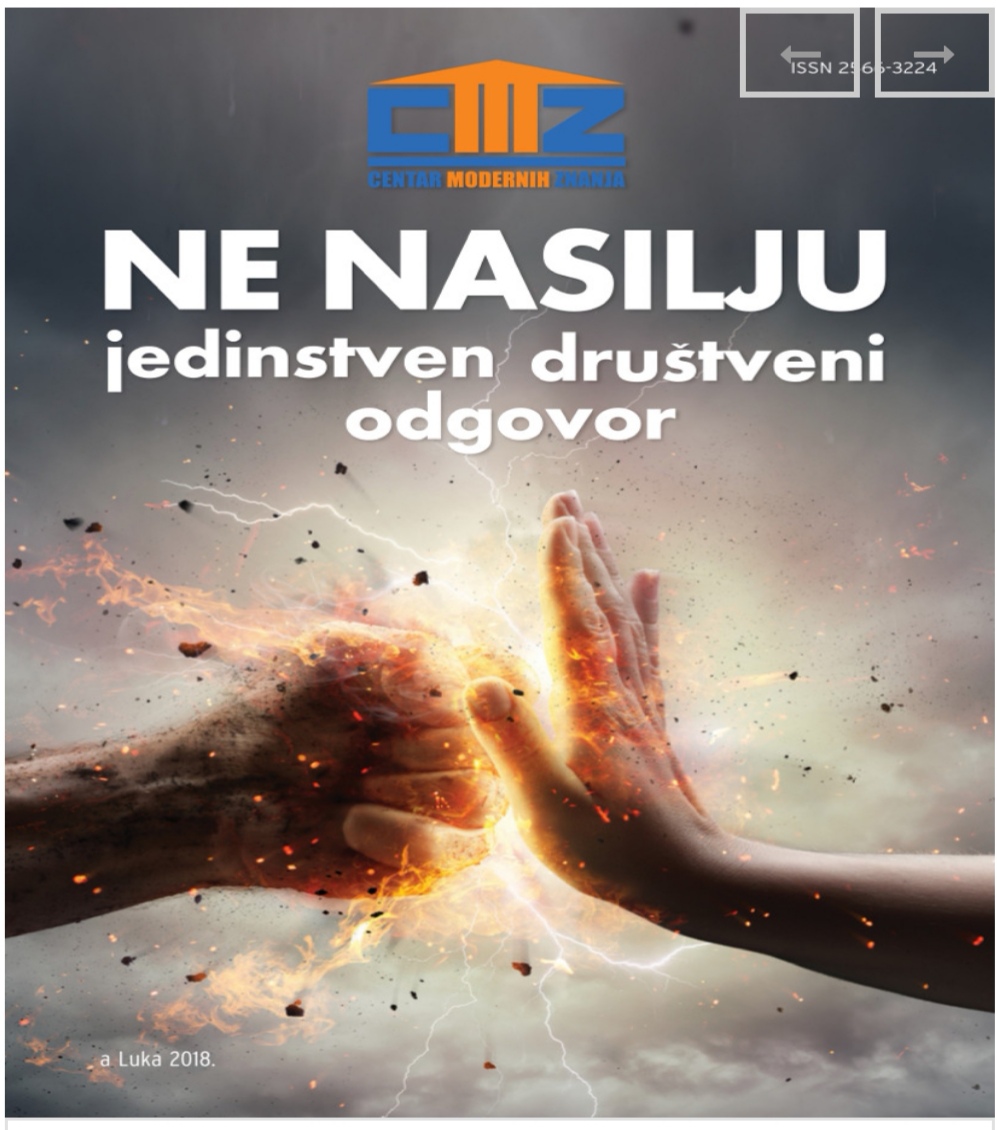
One of the most significant international documents of regional character in the field of protection against domestic violence is The Council of Europe Convention on preventing and combating violence against woman and domestic violence (Istanbul convention). The Republic of Serbia ratified the Istanbul Convention and in order to accomplish its binding obligations, adopted the Law on prevention of domestic violence, witch is applied from 01.06.2017. The aim of this paper is examination of compliance of this Low with the Istanbul Convention, examination of the effects of this law so far, with a special review of the problems of the Law enforcement. Considering that the Law on prevention of domestic violence is the new one, it is necessary to provide an equal treatment of all state organs who directly apply this Law and all doubts and legal dilemmas should be interpreted in conjunction with the primary purpose of this Law and with purpose is fight against domestic violence.
More...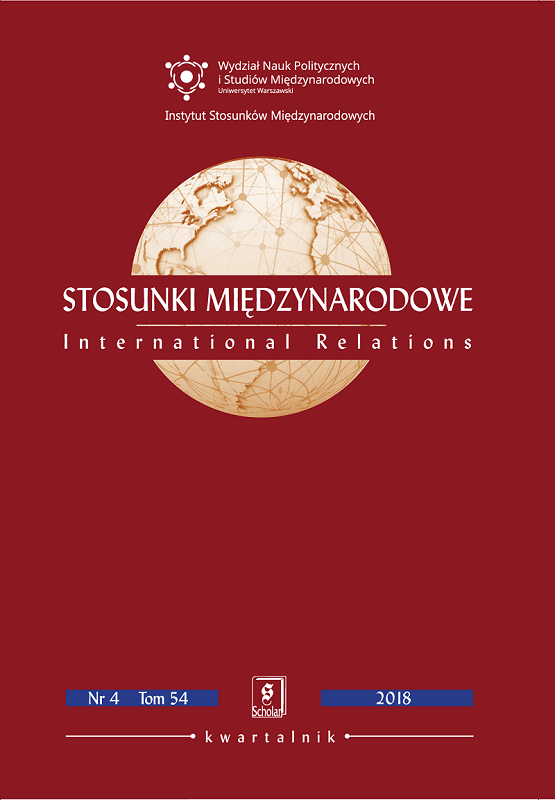
The aim of the article1 is the identification of components of maritime governanceand evolution of the concept of maritime governance in contemporary InternationalRelations. The main research questions are: what elements constitute the structureof maritime governance and why the role of maritime governance is increasingin the policy of super and regional powers. The answer to these questions will beused to verify the adopted hypothesis which indicates that maritime governanceis a dynamic process consisting of interdependent areas of legal regulations, blueeconomy, security and environmental elements. Their horizontal and verticalinterdependence and interrelation while dealing with oceans make maritimegovernance necessary instrument for super and regional powers to attain theirinterests.Based on the presented assumptions and purpose, the following structureof the article was adopted. The introduction highlights the role of oceans in theworld affairs and presents research questions and hypothesis. In the second partof the article main stages of discourse on maritime governance are discussedand characterized, putting emphasis on the process of shaping its conceptual andterminological framework. Methodological differences and similarities in definingmaritime governance are explored. The third part indicates the operational dimensionof the concept of maritime governance, presenting the stages of the process ofinstitutionalization of maritime cooperation between states. Finally, the case studyof the Integrated Maritime Policy of the European Union is presented to serve as anexemplification of the modern maritime governance. The conclusion of the articlecontains answers to the research questions posed.
More...
The aim of the article is the analysis the role of regional parties in shaping Indianforeign policy at the turn of the 20th and 21st centuries, which requires examiningthe premises for increasing the activity of regional parties in the international sphereand identifying formal and informal instruments by means of which they influencethe process of creating foreign policy. The theoretical tool used to analyze theactivity of regional parties in India constitutes the liberal theory of foreign policyis. Its use will allow us to verify the accepted hypothesis that regional parties aredynamizing India’s foreign policy, contributing to the enrichment of its contentand objectives, especially with regard to relations with neighboring countries andcooperation in the region of South Asia. The first part of the article discusses themain assumptions of the liberal theory of foreign policy. The second part identifiesconditions and institutional, as well as legal frameworks that condition internationalactivity of regional parties. The third part presents the evolution of the Indian partysystem and characterizes the selected regional parties. The fourth part analyzes theincrease of the activity of international regional parties on the example of someregional parties selected based on their importance and power of their influence.The summary presents the usefulness of the liberal theory of foreign policy inthe study on the increase of the importance of regional parties in shaping India’sforeign policy.
More...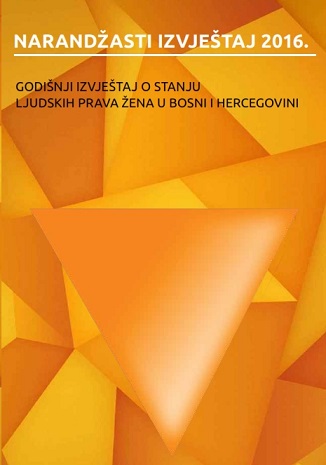
Usvajanjem novog Zakona o zaštiti od nasilja u porodici Federacije BiH 2013. godine unaprijeđeni su zakonski okviri za sistemsku borbu protiv nasilja u porodici i nasilja nad ženama. Član 35. Zakona predviđa da Federacija BiH i kantoni finansiraju sigurne kuće i to u razmjeru 70% Federacija – 30% kantoni. Zakon predviđa i jasnu obavezu da se usvoje podzakonski akti kojima će se jasno urediti osnivanje, rad i finansiranje sigurnih kuća, kao i standardi koji moraju biti ispunjeni da bi jedna sigurna kuća bila akreditirana i mogla dobiti podršku. Nažalost, u protekle tri godine ova obaveza nikada nije ispunjena, nego je rad šest postojećih sigurnih kuća prepušten samoregulaciji. Postojeće sigurne kuće su samostalno izradile studiju i procjenu godišnjih troškova jedne sigurne kuće. Procijenjeno je da rad i programi jedne sigurne kuće sa kapacitetom od 25 mjesta koštaju min. 240.000 KM godišnje. [...]
More...
Osobe ženskog spola su često izložene ozbiljnim oblicima nasilja, pogotovo verbalnom, fizičkom, psihičkom, seksualnom nasilju, silovanju i sl. Ovi i brojni drugi oblici nasilja nad ženama predstavljaju ozbiljno kršenje ljudskih prava žena i glavnu prepreku ostvarivanju jednakosti između žena i muškaraca. Statistike pokazuju da je svaka treća žena u svijetu žrtva nasilja, ali i da su počinioci tog nasilja najčešće njihovi sadašnji ili bivši partneri. Situacija nije mnogo drugačija ni u Bosni i Hercegovini, u kojoj se nasilje nad ženama i nasilje u porodici godinama smatralo privatnim problemom, a mnogi_e ga takvim smatraju i danas. 52,8% žena starijih od 15 godina u Bosni i Hercegovini iskusilo je neki vid nasilja. Studija o rasprostranjenosti i karakteristikama nasilja nad ženama u BiH, koja je nastala na osnovu istraživanja s uzorkom od 3.300 domaćinstava u BiH tokom 2013. godine, ukazuje na to da je svaka četvrta žena bila žrtva nasilja, a da je svaka deseta doživjela nasilje u posljednjih godinu dana (u 2013. godini). [...]
More...